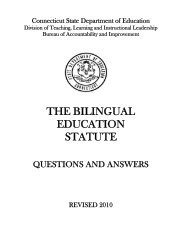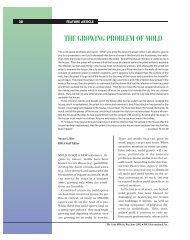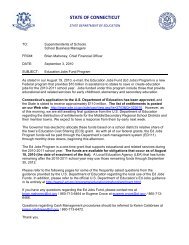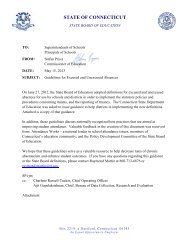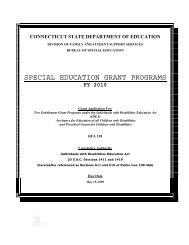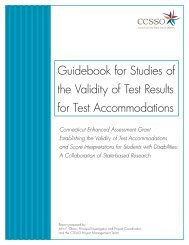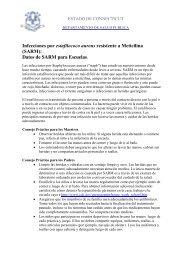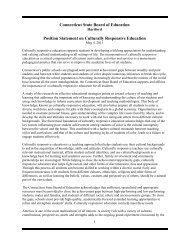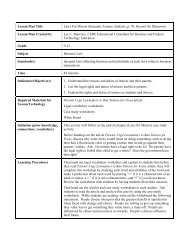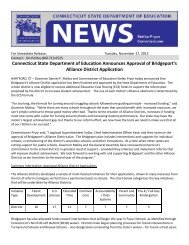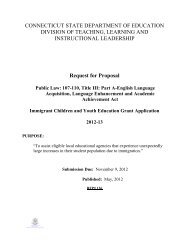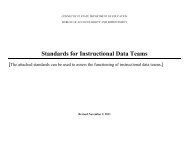Early Childhood - Connecticut State Department of Education
Early Childhood - Connecticut State Department of Education
Early Childhood - Connecticut State Department of Education
Create successful ePaper yourself
Turn your PDF publications into a flip-book with our unique Google optimized e-Paper software.
Assessment Chapter 4<br />
OBSERVING, RECORDING<br />
AND REFLECTING<br />
Observation, recording and reflecting are key tools<br />
for early childhood educators. We study children by<br />
gathering information over time and devoting energy to<br />
reflecting and planning for future growth and learning<br />
opportunities.<br />
Why Do We Observe?<br />
Observation is essential in the teaching pr<strong>of</strong>ession<br />
because children’s activity and thinking provide a<br />
window into their skills, knowledge and dispositions.<br />
Understanding these through observation helps teachers<br />
understand how best to facilitate children’s learning.<br />
Careful observation yields information on how to assist<br />
or extend learning, clarify or improve teaching strategies<br />
and the environment, document growth and progress,<br />
and communicate with parents and other teachers.<br />
Why Do We Record<br />
And Document Observations?<br />
The typical day <strong>of</strong> an early childhood teacher is filled<br />
with multiple tasks, decisions and emotions. At the<br />
end <strong>of</strong> a week it is difficult to remember a comment<br />
made by a child on Monday about block building, or a<br />
problem solved by two children on Wednesday using<br />
their words instead <strong>of</strong> their hands. Recording may, at<br />
first, feel laborious. Teachers may feel it takes precious<br />
time away from the children or necessary classroom<br />
tasks. However, when the process <strong>of</strong> observation and<br />
recording is organized systematically, it becomes an<br />
invaluable planning and teaching strategy.<br />
Reflections – How? Why?<br />
Collecting observations, work samples and photos is <strong>of</strong><br />
no use without organizing and reflecting on the value<br />
<strong>of</strong> what has been gathered. Reflecting is the process<br />
<strong>of</strong> thinking seriously, contemplating and considering.<br />
Reflection deepens our understanding <strong>of</strong> the child’s<br />
learning styles and strategies for working with others or<br />
alone in order to better interpret and plan. Reflection,<br />
thus, is the key to observation and recording.<br />
But reflection requires time for review and<br />
interpretation. It also requires a willingness to<br />
collaborate and rethink teaching processes and children’s<br />
performances. Reflection requires listening to oneself,<br />
to colleagues and most <strong>of</strong> all the children. By making<br />
time for reflection teachers validate the observations<br />
and information collected over time as being critical<br />
53<br />
to real understanding <strong>of</strong> children. Reflection is <strong>of</strong>ten<br />
best spent in collaboration with other pr<strong>of</strong>essionals<br />
on the same teaching team, and should involve lively<br />
discussion. Interpretations and clarifications evolve as<br />
growth is recognized and new directions and questions<br />
are suggested.<br />
Setting aside time is the critical key. Time<br />
reserved for reflection, even if short at first, will become<br />
more and more valuable. Devoting more time will<br />
become easier as improvements in effectiveness <strong>of</strong><br />
planning and interactions with children are recognized.<br />
How To Get Started<br />
Think <strong>of</strong> the process <strong>of</strong> observing as an opportunity<br />
to capture a moment, to create a photo in words <strong>of</strong> a<br />
specific point in time. Create a system that sets aside<br />
time each day, even brief 15-minute periods, just to<br />
observe. Rotate this task so many perspectives are<br />
“taken” on a child. One teacher observes and records<br />
while teammates are facilitating to ensure that the<br />
learning environment is maintained. Consider various<br />
approaches for recording and collecting, such as<br />
clipboards, organizing questions and post-its. Perhaps,<br />
begin by focusing on a favorite area <strong>of</strong> the classroom.<br />
Create a series <strong>of</strong> guiding questions, rather than waiting<br />
for something to record. Consider focusing on specific<br />
children. As a team, choose two or three children to<br />
observe for short periods <strong>of</strong> time over several days. At<br />
the end <strong>of</strong> a week collect the observations and spend<br />
time as a team reflecting on the information gathered.<br />
Look for patterns and try to answer questions such as,<br />
What do we know about this child that we didn’t know<br />
previously? What further questions do we have about<br />
this child? Based on the information we have, what<br />
should be planned or considered to further this child’s<br />
growth and progress?<br />
Eventually all <strong>of</strong> these techniques will become<br />
comfortable. Teachers may even find themselves<br />
stopping to record more <strong>of</strong>ten than expected because<br />
they are noticing more subtle behaviors.<br />
Questions And Language:<br />
Tools For Creating Valuable Observations<br />
Knowing what to observe and what to record are<br />
critical skills. At times there may be specific behaviors<br />
or activities on which the teacher should focus. At<br />
other times there may be interest in questions children<br />
raise, their use <strong>of</strong> language to communicate and solve<br />
problems, their interaction styles with peers, materials<br />
and adults, and their approach to tasks, to list just a<br />
few possibilities. Pages 64-65 provide a list <strong>of</strong> reflective<br />
questions associated with the developmental domains.



